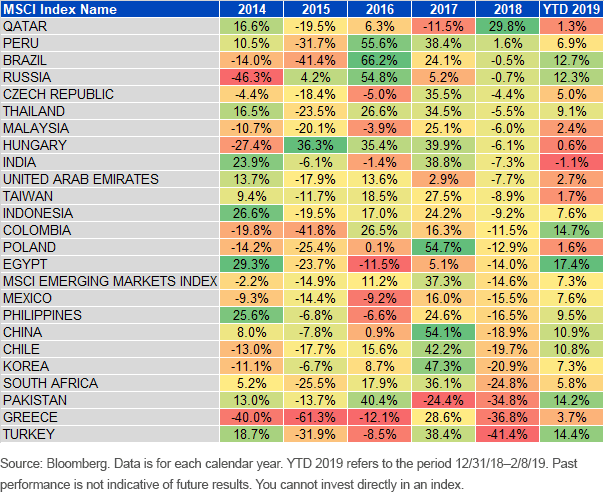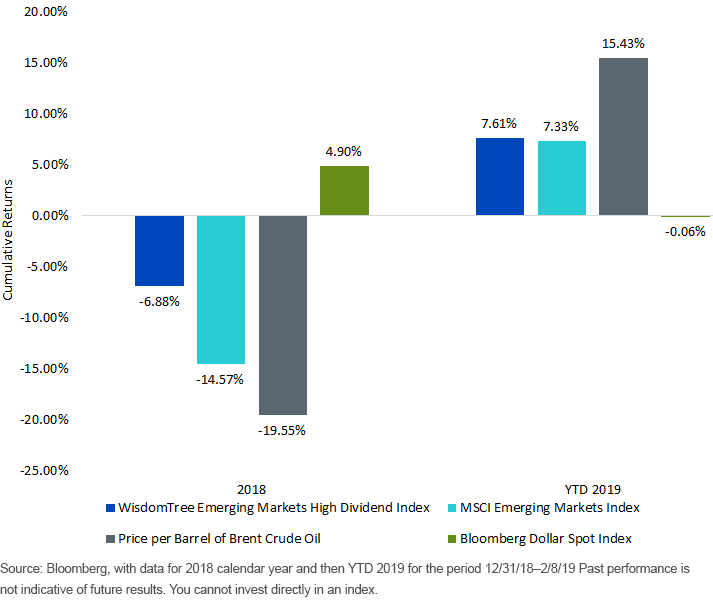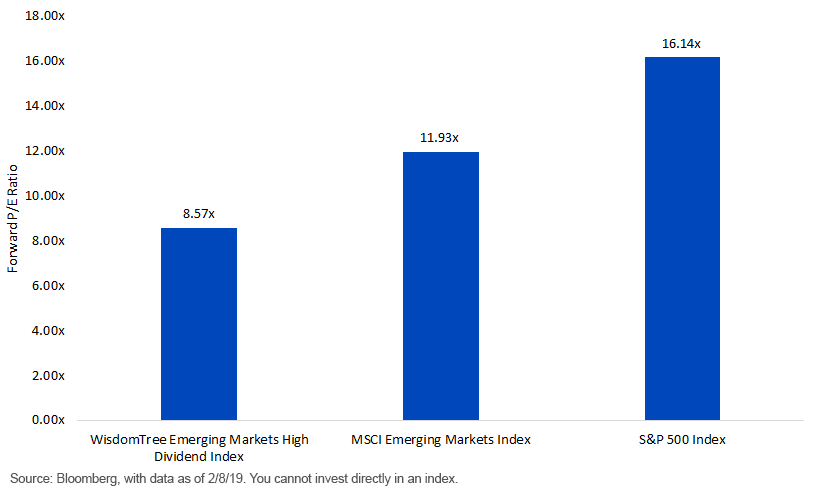The Beauty of a Rules-Based Approach in Emerging Markets


Over the past few years, it’s been difficult to make a reliable case for emerging market equities. Every time we take a closer look into this market, its low valuations tend to pique our interest, but it ends up underperforming U.S. equities nonetheless.
Let’s face it—this isn’t the easiest topic in today’s world.
And that’s exactly why this could be a great time to consider emerging market equities.
2018 Exhibited Some Mysterious Performance Characteristics
A few factors that tend to influence emerging market equity performance leap to the forefront of our considerations.
Factor 1: The U.S. dollar
The dollar appreciated in 2018, and the U.S. Federal Reserve raised the Federal Funds Rate as many times as had been expected—four. Historically speaking, this hasn’t been the best tailwind to emerging market equities.
Factor 2: Oil prices
This matters a lot to major oil-exporting countries (like Russia), and not nearly as much to others that are more import-focused (like India). For the full year, Brent Crude oil fell from about $67 per barrel to about $54—a 20% drop. During the year, the price rose all the way to levels above $85, and then proceeded to drop to almost $50. To say the least, oil’s volatility was a major factor affecting global markets beyond just those in emerging markets.
So now, for the mystery:
During U.S. dollar appreciation, the currencies of more commodity-focused emerging markets tend to be more volatile and depreciate more. If we also know the price of oil has dropped significantly—and many commodity exporters in emerging markets are oil-focused—we’d also predict that these countries would have struggled during the year.
- In figure 1, however, Qatar, Peru, Brazil and Russia were the top four country performers for 2018 . Each outperformed the broader MSCI Emerging Markets Index benchmark by more than 10%. Each country is heavily involved in the petroleum industry. Figure 1’s returns are also in U.S. dollars, thereby showing both the impact of the equity returns as well as the currency returns against the U.S. dollar. Despite a tough environment for oil, these countries delivered.
- For Qatar and Russia in particular, perhaps 2018 represented a recovery rally measured against what happened in 2017, when these markets underperformed.
- We’d focus more on Brazil and Russia and how these markets have continued to rally thus far in 2019.
Looking at figure 1 and recognizing just how tricky 2018 was to predict, we use the fact that the better performers (green) and the worse performers (red) jump around year to year to help people see how difficult it can be to predict the top country performers. The benefit of a rules-based approach: it happens automatically!
Figure 1: Intuition Didn’t Match 2018 Results

The Brilliance of a Rules-Based Approach
The WisdomTree Emerging Markets High Dividend Index is designed to focus on the highest-yielding dividend payers in emerging markets that generate the largest cash dividends. Brazil and Russia have been large exposures in recent years. The Energy sector has also been outsized, as a significant over-weight relative to the MSCI Emerging Markets Index in recent years.
To be honest, if I knew that oil would drop some 20% and the dollar would be strong, I wouldn’t be excited about being over-weight in positions like Russia or Energy.
Yet look at figure 2:
- The WisdomTree Emerging Markets High Dividend Index delivered almost 800 basis points of outperformance in 2018, which is not an easy feat when the broad benchmark was down nearly 14.6%.
- The WisdomTree Emerging Markets High Dividend Index was significantly over-weight in the Energy sector and Russia as a country compared with the MSCI Emerging Markets Index. This happened because companies in the Energy sector and in Russia had high-dividend yields and paid massive cash dividends. Thankfully, not one ounce of this depended on human foresight, which likely would have tried to get out of Russia or Energy, among the top-performing places to be during 2018 in emerging markets.
Figure 2: Forget Intuition—the Process found the Better-Performing Areas!

Valuation, Valuation, Valuation
We all know the expression “location, location, location” in real estate. In the short term, prices can exhibit volatility, but in the long term, location is what matters.
We feel the same way about valuation within equity investments.
In the longer run, we don’t find many stories in which investors allocated to broad-based strategies with hundreds of constituents and were disappointed when allocating to single-digit multiples. We find a lot of stories about people who wish that they could go back in time, with hindsight, to do so.
As figure 3 shows, and as we alluded to before, emerging markets are looking comparatively cheap once again, and that’s why they’re still worthy of consideration.
Figure 3: Single-Digit P/E Ratios, with the Proper Time Horizon, Are Always Exciting


Christopher Gannatti began at WisdomTree as a Research Analyst in December 2010, working directly with Jeremy Schwartz, CFA®, Director of Research. In January of 2014, he was promoted to Associate Director of Research where he was responsible to lead different groups of analysts and strategists within the broader Research team at WisdomTree. In February of 2018, Christopher was promoted to Head of Research, Europe, where he was based out of WisdomTree’s London office and was responsible for the full WisdomTree research effort within the European market, as well as supporting the UCITs platform globally. In November 2021, Christopher was promoted to Global Head of Research, now responsible for numerous communications on investment strategy globally, particularly in the thematic equity space. Christopher came to WisdomTree from Lord Abbett, where he worked for four and a half years as a Regional Consultant. He received his MBA in Quantitative Finance, Accounting, and Economics from NYU’s Stern School of Business in 2010, and he received his bachelor’s degree from Colgate University in Economics in 2006. Christopher is a holder of the Chartered Financial Analyst Designation.

